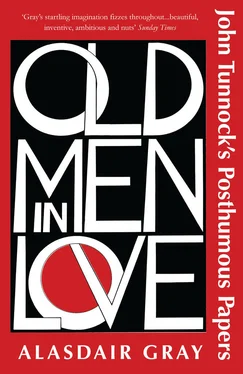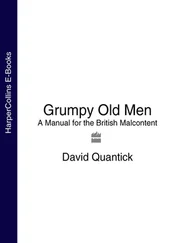I explained why and pointed to the sideboard, suggesting we drink to celebrate the birth of a grand new idea that would let my original masterpiece — my life task! — be completed in two or three months instead of years. She poured me a big whisky and herself a small one, “You need a holiday.”
I denied that because from now on I would be working hard every day and evening. She said she was not suggesting a long holiday — just a night or weekend away. I said fine, where did she want us to go? She said it was me who needed the holiday, not her. I said, “I’m not taking a holiday by myself!”
She said, “Of course not. I’ll get somebody to go with you, what about Is? You’re keen on Is. She introduced us.”
That was gibberish. I told her Isobel had never introduced us because she (Zoe) had introduced herself. She said, “Aye, alright, but I can get you someone else you’ll like, someone younger than me — I’m ancient.”
I told her I didn’t want anyone but her. She sighed and spoke slowly like a schoolmistress to a stupid but not hopeless pupil. She said something like this:
“I’ve an important job coming up. It will look like a party but it’s really a business meeting. A lot of folk you wouldnae like will be here and they wouldnae like you so take the night off. I’ll book you into the Buchanan Arms Hotel near Drymen with Is or Mish or anybody else you want. I think I could even get Niki back for a night without Mo, if you’re keen. I know all kinds of lassies who’ll let you do anything you want with them without you having to pay a penny.”
I sat down because this speech made me feel crippled in every limb. At last I said I loved her.
“Same back,” she said, “but I really do need this place for a night without you around. I’ll tell you why. It’s like this —”
I interrupted, saying I wanted to know NOTHING about her business because it was obviously a business no respectable householder would ever want to know. My house had once been the manse of Hillhead Parish Church. My mother and aunts and I had spent most of our lives here and I would not let her (Zoe) turn it into a den of thieves. I don’t know why that biblical phrase popped out of me but it impressed Zoe. She went pale, said I could stay at home if I just locked myself in our bedroom for five or six hours and pretended nothing was happening outside it. I said, “Meet your strange pals in one of their own houses.”
She said, “I wouldnae be safe if I did.”
“Then you should get rid of them,” I said firmly, “they must not come here,” and busied myself again with my papers. She said, “But that could get me into a lot of trouble — you too.”
In coarse demotic Glaswegian I told her I wasnae feart, and heard her leave the room, then the front door slam as she left the house. This was our first quarrel, but if my experience of Niki, Yvonne etcetera is anything to go by it will not be the last. She did not come home last night but I am certain she will return soon. This waiting would drive me mad if Who Paid for all This? was not occupying nine-tenths of my acting intelligence.
That title, however, will no longer suit a trilogy that contains my Belovéd Prince Henry, no no no, I will call it Money at Play, and to Hell with the muscles of worn-out workmen, the broken hearts and crazed brains of defeated women and children and what is happening now in Scotland. Concentrate on the trial of Socrates.
I once thought it was held on a hillside west of the Acropolis where the Athenian parliament met, but Elizabeth Moignard says the likeliest place was the council house on the marketplace. 61 The entrance lobby before the trial started would be thronged by folk wanting jury service as trade would not have recovered from the Athenian empire’s collapse three years earlier, so a juror’s wage was desirable. The selection process must have been lengthy, being designed to ensure parity between three main voting districts: the high ground where farmers and tradesmen lived; the plain with its owners of rich estates; the coast where lived merchants, dockers and seamen. There must have been many arguments between court officials chosen by lot and citizens who felt unfairly excluded. It would be afternoon before all 899 jurors were admitted: a number ensuring votes for and against the accused were never even. Since the president was chosen by lot I will make him the farmer who did most of the talking in my first chapter. There was no Athenian legal profession so trials were run like the Athenian parliament. Any citizen could denounce another in court, then the accused spoke in their own defence, then innocence or guilt was decided by a majority vote.
Plato says Socrates was accused by someone put up to the job by Anytus, a dealer in leather who had recently fought to depose the tyrants installed by Sparta. But the reasons for the trial will be clearer if Anytus is on stage instead of a front man. I imagine him tall, gaunt and tense, standing to one side of the president’s chair, talking to a group of supporters as the jurors settle into their places. Socrates, of course, stands on the other side of the chair chatting cheerfully to friends. The siege of Potidia is now twenty years ago. Socrates is seventy with bald, wrinkled brow above alert eyes, piggy nose, bushy white moustache and beard. His hands are clasped on a stout walking stick over which he sometimes leans to hear someone talking quietly to him. His friends would not be noticed in isolation, but their characters and manners are so different that together they look distinctly odd.
I will follow the example of Plato in writing out the trial like a play of speeches between accuser and accused, but my courtroom drama will have four witnesses Plato never refers to, also a noisier jury.

30: THE TRIAL OF SOCRATES

The jurors’ hubbub is interrupted by an official striking a gong, ringing a bell or smiting a board with a mallet. Silence begins to fall as our old friend the farmer, looking like any other venerable citizen, stands up in front of the presidential chair while Anytus and Socrates settle into chairs on each side of him, Socrates sitting comfortably with hands folded on top of the stick between his legs.
PRESIDENT: Men of Athens, the trial is starting! Will that gaggle at the back please shut up? Worse than women some of you. Alright Anytus. State the charge and give your reasons. ( He sits .)
Anytus, standing up, speaks calmly, clearly.
ANYTUS: Socrates is a criminal, firstly by not believing in the Gods of our nation; secondly, by preaching a false God of his own; thirdly, by corrupting our young men. If you agree with me then you must also agree that the proper punishment is death.
Men of Athens, we all know Socrates. He’s a charming old fellow, an eccentric, knows the richest men in Athens and dresses like a scarecrow. He’s seventy, a widower remarried with a grownup son and two infants, yet the people he loves most are attractive young men. Most of us were children when he gave up his business and became an expert. He stood about the public places like the others; he talked enthusiastically like the others; he acquired followers just like the others; but he never gave public lectures and nobody knew what he was expert at. The other experts were wise about something — politics, medicine, arithmetic, the stars. Socrates mentioned these but didn’t seem specially keen on any. Most of us thought him an ambitious simpleton, a fool who wanted to be wise but didn’t know how to do it. There was a joke at the time: “What is Socrates wise about?” Answer: “He’s wise about wisdom.” Then one day a disciple of his asked the oracle of Apollo at Delphi who was the wisest man in Greece and the oracle said “Socrates” –
Читать дальше














